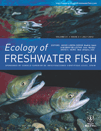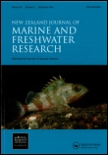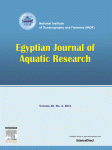
ECOLOGY OF FRESHWATER FISH
Scope & Guideline
Shaping the future of freshwater conservation.
Introduction
Aims and Scopes
- Ecological Interactions:
Research focusing on predator-prey dynamics, competition, and the role of fish in freshwater ecosystems, exploring how these interactions shape community structures and biodiversity. - Conservation and Management:
Studies aimed at understanding the impacts of human activities, such as habitat alteration and invasive species, on fish populations, providing insights for effective conservation strategies. - Life History and Behavioral Ecology:
Investigations into the life history strategies, reproductive behaviors, and individual traits of fish species, contributing to a deeper understanding of their adaptability and resilience in changing environments. - Hydrological Influences:
Research examining how variations in hydrology, such as flow regimes and water quality, affect fish distribution, behavior, and community dynamics in freshwater habitats. - Trophic Ecology:
Exploration of feeding relationships, dietary preferences, and the role of fish in nutrient cycling within freshwater ecosystems, highlighting the significance of trophic interactions.
Trending and Emerging
- Impact of Climate Change:
There is an increasing focus on how climate change affects freshwater fish populations and ecosystems, including studies on temperature effects, altered hydrological patterns, and species distribution shifts. - Invasive Species Dynamics:
Research on the effects of invasive fish species continues to rise, particularly regarding their interactions with native species, ecosystem functions, and management strategies to mitigate their impacts. - Genetic and Morphological Studies:
Emerging themes include the use of genetic tools to understand population structure, hybridization, and evolutionary dynamics among freshwater fish species, emphasizing the importance of genetic diversity for conservation. - Ecosystem Services and Functions:
There is a growing interest in the role of freshwater fish in providing ecosystem services, such as nutrient cycling and habitat maintenance, linking fish ecology to broader environmental and societal issues. - Technological Advances in Monitoring:
The application of new technologies, such as acoustic telemetry and environmental DNA (eDNA), is trending, providing innovative methods for studying fish behavior, movement patterns, and community dynamics.
Declining or Waning
- Traditional Taxonomy:
Research primarily focused on taxonomic classification of fish species is diminishing, as the field shifts towards functional and ecological perspectives that emphasize the roles of species within their ecosystems. - Single-Species Studies:
There is a waning interest in studies that examine fish species in isolation without considering ecological interactions or environmental contexts, as integrative approaches become more favored. - Static Habitat Assessments:
Research that solely assesses fish habitats without considering dynamic environmental changes or anthropogenic impacts is declining, reflecting a growing understanding of the importance of temporal and spatial variability.
Similar Journals

International Journal of Limnology
Connecting Scholars to Freshwater FuturesThe International Journal of Limnology, published by EDP SCIENCES S A, is a cutting-edge journal dedicated to the field of aquatic sciences, with a strong emphasis on limnology—the study of inland waters. Headquartered in France, the journal serves as a vital resource for scholars and practitioners alike, aiming to advance the understanding of freshwater ecosystems and their management. With an e-ISSN of 2823-1465 and classified within the Q3 category of the 2023 Aquatic Science quartiles, it occupies a significant niche in academic research, ranking 150 out of 247 in Scopus listings. The journal’s open access policy ensures that research findings are widely disseminated, facilitating collaboration and innovation across global aquatic science communities. Published continuously from 2022 to 2024, the International Journal of Limnology aspires to contribute to sustainable practices and enhance ecological understanding, making it an essential publication for researchers, professionals, and students committed to the stewardship of aquatic resources.

RAFFLES BULLETIN OF ZOOLOGY
Connecting Insights in Zoology and ConservationRaffles Bulletin of Zoology, published by the National University of Singapore's Lee Kong Chian Natural History Museum, serves as a prestigious platform for the dissemination of cutting-edge research in Animal Science and Zoology, as well as Ecology, Evolution, Behavior and Systematics. With a current impact factor reflective of its Q2 category in both fields, this journal not only enhances its visibility in the academic community but also provides valuable insights into the complexities of biodiversity and conservation efforts. Covering a wide array of topics, Raffles Bulletin facilitates interdisciplinary collaboration and serves as an essential resource for researchers, professionals, and students alike. It is indexed in Scopus, ranking #233 out of 490 in Animal Science and Zoology and #406 out of 721 in Ecology, ensuring that the research published contributes significantly to the global discourse on wildlife and ecosystem management. Since its inception in 1996, this journal has bridged gaps in knowledge and continues to foster a deeper understanding of the living world.

Fishes is a premier academic journal dedicated to the exploration and dissemination of cutting-edge research in the fields of aquatic science and ecology. Published by MDPI in Switzerland, this open-access journal has been accessible to researchers globally since its inception in 2016, allowing for the rapid exchange of knowledge that fosters scientific advancement in the study of fish and aquatic ecosystems. With its convergence in the years 2016 to 2024, Fishes proudly holds a notable position in the academic community, evidenced by its category quartile rankings of Q3 in Aquatic Science and Q2 in Ecology for 2023. The journal consistently features innovative research encompassing ecological interactions, conservation strategies, and evolutionary studies within aquatic environments. By integrating interdisciplinary approaches and encouraging contributions from a diverse array of experts, Fishes serves as an invaluable resource for researchers, professionals, and students alike, contributing to the understanding and preservation of our precious aquatic biodiversity.

NEW ZEALAND JOURNAL OF MARINE AND FRESHWATER RESEARCH
Innovating Research for Sustainable Water ManagementNEW ZEALAND JOURNAL OF MARINE AND FRESHWATER RESEARCH, published by Taylor & Francis Ltd, stands as a distinguished platform for the dissemination of innovative research in the realms of aquatic science and ecology. With an ISSN of 0028-8330 and E-ISSN 1175-8805, this journal has been curating significant scientific contributions since its inception in 1967, continuing through to 2024. Recognized in the Q2 category across multiple relevant fields—including Aquatic Science, Ecology, and Water Science—this journal ranks notably in Scopus, with a 74th percentile for Ecology, Evolution, Behavior and Systematics, highlighting its impact and relevance within the scientific community. Though not an open-access publication, its rigorous peer-reviewed articles offer insights that resonate with researchers, professionals, and students who are passionate about advancing our understanding of freshwater and marine ecosystems. By fostering a collaborative space for ecological and environmental inquiries, the NEW ZEALAND JOURNAL OF MARINE AND FRESHWATER RESEARCH is essential for those aiming to contribute to the vital conversations around biodiversity, conservation, and sustainable management of aquatic resources.

ENVIRONMENTAL BIOLOGY OF FISHES
Unveiling the secrets of fish ecology and behavior.ENVIRONMENTAL BIOLOGY OF FISHES, published by SPRINGER, is a premier journal in the fields of Aquatic Science and Ecology, Evolution, Behavior and Systematics. With a rich history spanning from 1976 to 2024, this esteemed journal provides a platform for groundbreaking research that addresses critical issues such as fish ecology, species behavior, and environmental influences on aquatic life. Recognized for its significant contributions, it holds a Q2 ranking in both the Aquatic Science and Ecology categories, reflecting its influence and relevancy in the academic community. The journal's focus on innovative ecological studies makes it an essential resource for researchers, professionals, and students dedicated to advancing our understanding of fish biology and the broader ecological systems of which they are a part. Although not an open-access publication, the insights and findings presented in its articles are invaluable for those engaged in the preservation and sustainable management of aquatic environments.

Freshwater Crayfish
Fostering Insights into Crayfish Behavior and EcologyFreshwater Crayfish, published by the International Association of Astacology, is a peer-reviewed journal dedicated to the comprehensive study of freshwater crayfish, encompassing their ecology, behavior, conservation, and management. With an ISSN of 2076-4324 and an E-ISSN of 2076-4332, this journal serves as an essential platform for researchers, professionals, and students in aquatic science, particularly within the fields of Ecology, Evolution, Behavior and Systematics and Aquatic Science, where it ranks notably in Scopus rankings. The journal has a consistent publication history since 2008, enhancing its relevance and contribution to the scientific community. While it operates under an open-access model, allowing for wide dissemination of research findings, it is particularly noted for its significant impact on advancing knowledge in the preservation and sustainable management of crayfish species. This makes Freshwater Crayfish a vital resource for those passionate about aquatic biodiversity and conservation.

Egyptian Journal of Aquatic Research
Driving excellence in aquatic research and innovation.Welcome to the Egyptian Journal of Aquatic Research, a premier peer-reviewed academic journal published by ELSEVIER, dedicated to advancing the field of aquatic sciences. With a robust impact factor and recognition as a Q1 journal in key categories such as Aquatic Science and Ecology, this open access journal has established itself as a vital platform for disseminating high-quality research since its inception in 2012. The journal aims to provide comprehensive coverage of topics including ecology, evolutionary biology, and water science, making it a crucial resource for researchers, professionals, and students engaged in these dynamic fields. With Scopus rankings placing it in the top echelons of various categories, the Egyptian Journal of Aquatic Research fosters innovation, collaboration, and knowledge dissemination on a global scale, making it an indispensable asset for anyone invested in understanding and preserving aquatic systems.

MARINE AND FRESHWATER RESEARCH
Pioneering insights into aquatic ecology and sustainability.Marine and Freshwater Research is a prestigious journal published by CSIRO PUBLISHING that serves as a key platform for the dissemination of cutting-edge research in the fields of Aquatic Science, Ecology, and Oceanography. With an impactful presence since its inception in 1948, the journal provides critical insights into the dynamics of freshwater and marine ecosystems, promoting interdisciplinary approaches that contribute to our understanding of biodiversity and sustainability. Currently ranked in the Q2 category across major scientific domains, including Ecology and Aquatic Science, it enjoys a robust academic reputation supported by impressive Scopus rankings, such as Rank #66/247 in Aquatic Science and Rank #44/145 in Oceanography, reflecting its high citation impact and relevance. While offering a subscription-based access model, the journal remains dedicated to fostering dialogue and innovation within the scientific community, aiming to bridge the gap between research findings and practical applications in environmental management. Located in Australia, Marine and Freshwater Research is an essential resource for researchers, professionals, and students dedicated to exploring the complexities of aquatic ecosystems and advocating for their preservation.

ACTA ICHTHYOLOGICA ET PISCATORIA
Fostering collaboration in aquatic research.ACTA ICHTHYOLOGICA ET PISCATORIA is a distinguished peer-reviewed journal dedicated to the field of ichthyology and fisheries science, published by PENSOFT PUBLISHERS since its establishment as an open-access publication in 1970. Based in Poland, this journal serves as an essential platform for researchers, professionals, and students aiming to contribute to the scientific understanding of aquatic life. With an impressive H-index reflecting its growing influence, ACTA ICHTHYOLOGICA ET PISCATORIA is currently ranked in the Q3 quartile within both the Animal Science and Zoology and Aquatic Science categories. According to Scopus, it holds a rank of #227 in Animal Science and Zoology and #147 in Aquatic Science, demonstrating its relevance and contribution to these fields. The journal’s commitment to open access ensures that research findings are widely disseminated, fostering collaboration and knowledge sharing among the scientific community. With a historical scope extending from 1996 to 2024, ACTA ICHTHYOLOGICA ET PISCATORIA remains a vital resource for advancing aquatic research and fostering new insights into the complexities of fish biology and fisheries management.

LIMNETICA
Unveiling insights into the world's freshwater habitats.LIMNETICA is a prestigious academic journal dedicated to advancing the field of Aquatic Science, Ecology, and Water Science and Technology. Published by the Asociación Española de Limnología in Spain, this journal serves as a vital platform for researchers and professionals seeking to share their findings and insights from 1996 to 2024. With a commendable Q2 ranking in Ecology and notable Q3 rankings in Aquatic Science and Water Science and Technology, LIMNETICA emphasizes high-quality, peer-reviewed research that contributes to our understanding of freshwater ecosystems. Although currently not classified under Open Access, its rigorous indexing and Scopus rankings—positioning it in the top 64th percentile for Environmental Science—illustrate its impact in the scientific community. Researchers, students, and professionals are encouraged to engage with LIMNETICA to stay abreast of key developments and foster collaborative efforts in aquatic research.